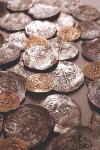Army and Navy Mutinies

Unrest among the Guards and artillery regiments in the spring of 1797 was quickly brought under control. The two naval mutinies were much more complex affairs, and of these, the mutiny at the Nore anchorage was the most serious. The Spithead mutiny broke out on 16 April. Following negotiations with the mutineers, the government agreed to a pay increase, better food, and a pardon. A royal proclamation confirmed the settlement on 21 April, and had not been for an administrative delay, the mutiny would probably have ended at that point. It did end on 15 May in a mood of general good humour, thanks partly to the esteem in which the men held Admiral Howe, who had been sent to Portsmouth with copies of the pardon and the newly enacted legislation. The Nore mutiny lasted from 12 May until 16 June, and was marked by the government’s unwillingness to negotiate, and by the more militant attitude of the mutineers, some of whom had French sympathies. Not only were convoys delayed for want of naval escorts, commercial traffic on the Thames was impeded, and London was threatened with a blockade. The government responded by withholding supplies from mutinous ships and removing navigation aids from the Thames. Legislation was hurriedly enacted to prevent the seduction of sailors away from their duty and to restrict contact with the ships in mutiny. On 6 June a royal proclamation declared the mutineers rebels and excluded the ringleaders from any pardon that might be forthcoming. When the mutiny finally collapsed, Richard Parker, the ‘president of the delegates’ was convicted of treason and hanged, and a number of other men were executed, flogged, or transported. The vast majority of those who had participated in the mutiny, however, simply returned to their duty, and helped to defeat the Dutch in the battle of Camperdown later that year.
